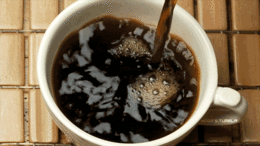Reaserchers have found that the level of noise that matches the bustle of a coffeeshop – around 70 decibels – spurs more creative performance than the quiet of 50 decibels or the distracting blender volume of 85 decibels.
Something strangely productive happened in 17th-century England: The meeting spot of choice changed from ale house to coffeehouse, and correspondingly, a population went from intoxication to stimulation–and as Where Ideas Come Fromauthor Steven Johnson observes, a flowering of innovation soon followed.
This burst, he argues, comes from a number of factors: beyond the caffeination, sitting shoulder-to-shoulder with other yabbering thought mongers availed people to spill their ideas (and drinks) onto one another, adding nodes to their networks and dipping into serendipity. And as the New York Times reports, coffee shops just soundcreative.

How so? University of Illinois researchers asked subjects to brainstorm product ideas while being subjected to various levels of noise. The results are fascinating: They found that the level of noise that matches the bustle of a coffee shop–around 70 decibels–spurs more creative performance than the quiet of 50 decibels or the distracting blender volume of 85 decibels.
Why? While extreme quiet lends focus, the kind you need to do your taxes or proofreading a paper, the Times reports, it inhibits creative thinking. The cognitive rub is this: a moderate, café-size amount of noise gives your thinking what’s calledprocessing disfluency–that is, a slight difficulty in your experience of processing information.
That little wrinkle rankles your thinking in a positive way: When used in a psychological context, fluency is the ease and rapidity with which you experience your thinking. The objects around you become fluent when you see them a bunch of times: Since they’re not new to you, they glide through your perception–and, we may infer, you don’t think critically about them.
But a touch of noise, a pinch of distraction, and a sprinkle of conversation can cause a helpful disfluency, which, research suggests, spurs you to think on a more abstract level.
WHAT DOES CREATIVITY SOUND LIKE?
Others have found that listening to your favorite songs before or while you work can enhance your productivity–as long as you don’t sing along to the point of distraction.
Taken together, these points appear to be another advertisement for being mindful about your distraction diet: Enough stimulation can help you get deeper into your work–but too much can pull you out.

















 CAPS: the new proprietary system using capsules made of 85% recycled aluminium
CAPS: the new proprietary system using capsules made of 85% recycled aluminium